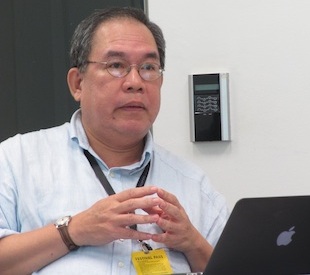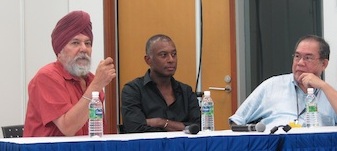At the Singapore Writers Fest 2011, Filipino writer and teacher Butch Dalisay might be the most political I’ve heard him, probably the most comfortably honest. It isn’t everyday after all that we admit to a lack of readership where we come from in Manila and sincerely seem sad about it, not often that a powerful writer from our shores will bravely enter into a conversation about what ails his writing production, what limits it, what renders it moot and academic given the state of the nation from which it sprouts. Not everyday that we hear any of our writers admit matter-of-fact, “I’d rather have a thousand readers at home than have 10,000 readers in New York," and actually mean it. Here is where Dalisay proves he shouldn’t be dismissed as one of the older members of the local literati, which is still in the bubble of believing the romances that surround cultural production, at the core of which is the idea that the task of writing is apolitical and is just about the craft, removed and extraneous to context. A recent anthology of Philippine poetry asserts that “the Filipino is not a theory <…> we are not academic," and discourse while “necessary <…> must not be propelled by a presumptuous tone that actually stunts literature’s growth" (Joel Toledo and Khavn dela Cruz from Under The Storm, 2011) – all very dangerous statements to make at a time when literature is necessary weapon.

I'd rather have a thousand readers at home than 10,000 readers in New York, says Dalisay.
This is why Dalisay’s assertions about writing in the Philippines, truthful and honest and self-deprecating, can only be important and relevant. Speaking in a panel on writing and globalization with UK writer Caryl Phillips, as moderated by Singapore’s Kirpal Singh, and in a meet-the-author session with Singapore-based Filipino journalist Mayo Martin, Dalisay talked about Philippine writing with a keen and grounded sense of what it’s up against, what it has to have, what ails it altogether – all on the level of theory and discourse. Globalization is necessary context, one that Dalisay admits he has “no degree of comfort with" seeing on the one hand the doors that it opens, at the same time that it’s clear how it threatens the work of the Filipino cultural worker who is faced with changes so swift and strong he equates it with a strong intensity earthquake and the tsunami that follows it. Of course the discomfort has to do with being writer from the periphery, whose struggle to be acknowledged by the center of publishing that’s America, globalization hasn’t made any easier. Yet Dalisay is truthful enough to admit that this can only be secondary to the bigger question of how does one get to be read by people at home, when those who do read will pick up Harry Potter or Twilight instead of a local book? And then there’s this line that’s clearly drawn: we sacrifice a bigger local audience with the goal of gaining an international one. That the latter is ironically a function of being educated and having the skill in writing in English is not lost on Dalisay: here he was speaking at an international writers’ fest when there’s a vibrant literary production in the other Philippine languages, here he was talking about the task of reaching an international audience, when publishing in English means writing for a very small market at home. And ultimately here was Dalisay admitting that while there are advantages to being a Filipino writing in English – MFAs and writers’ fests included – despite and given globalization, “not everyone has a key to that door."

Butch Dalisay (right) with UK writer Caryl Phillips (middle) and Singaporean writer Kirpal Singh in a panel on globalization and writing.
Which, if these two talks of Dalisay are any indication, is something that has everything to do with what our texts have and what ails our texts by default given colonial history. We are out of the Commonwealth loop, Dalisay asserts, and while American colonization gave us the English that we use for our writing, we all seem to have forgotten that, and we’re like the bastard children that appear at the family Christmas dinner. There are no favors to be had from our colonial fathers here, and it can only be difficult to deal with expectations. Such as what Dalisay sees to be the “mournful wail of oppression" as the one thing expected of work from the Philippines, the main thing a writer must be able to work against. But towards what? Again another bottomline: the problem is that even we don’t know what we’re about, so how do we even begin projecting ourselves to the world? Maybe we begin with what is inescapable. As far as Dalisay is concerned, there’s no escaping class, not for any writer, not for any kind of writing. There’s no avoiding the divide between rich and poor, and in that sense it could be a trope, the one thing that we cannot ignore in the task of writing, especially in English, especially given that this means having very few readers where we come from. And it is a trope that encompasses even that which Dalisay considers to be the most important story for Filipinos of our time: the diaspora. Now this assertion in itself isn’t surprising for Dalisay given his most recent work Soledad’s Sister (2010), but it’s infinitely comforting to find that he isn’t going all Filipino-American-discourse on us, as he is insisting that the diasporic condition is one that’s still intricately tied to class divisions at home, only this time rendered elsewhere in the world. In the essay “With Windows Open," which he read for the meet-the-author session, Dalisay speaks of the painfully differing manners of movement for Filipinos, where the distance between one Filipino to the next is so starkly riddled with the issue of class. To Dalisay, class is the one struggle that exists for us, regardless of where we are in the world: where Filipinos will look at each other, acknowledge sameness, and quickly look away from each other. That silence carries the weight of class taken from Philippine shores and transposed to elsewhere in the world. It’s a silence that is deafening. That it’s one that Dalisay works with, and articulates about the literature and writing we do as Filipinos, can only be worth celebrating. That it is inadvertently a response to those of us who still think creativity is beyond theory, is just wonderful. -
YA, GMA News Jose “Butch" Dalisay, Jr. was one of two featured Filipino authors (the other one being National Artist F. Sionil Jose) at the Singapore Writers Festival 2011, which ran from October 21 to 30. 






